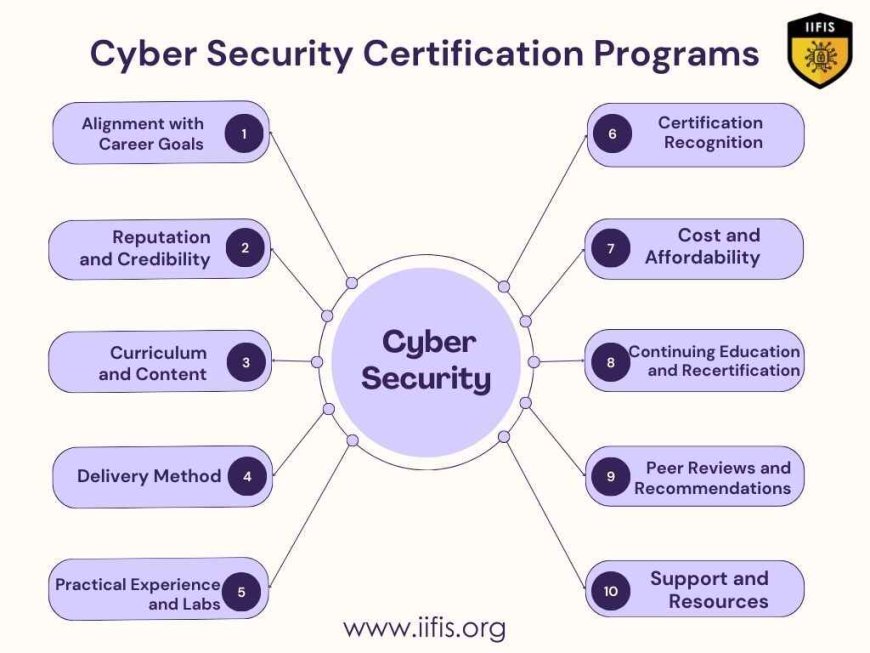Notable Cyber Security Certification Programs.
Explore top cyber security certification programs to enhance your skills. Find notable courses for career advancement in cybersecurity.

Cybersecurity certification programs provide structured training in key topics and approaches, making them critical starting points for individuals looking to begin or advance in the area. These courses give participants the technical know-how and analytical skills needed to defend against present online dangers successfully. Additionally, certificates provide verifiable evidence of proficiency and commitment to cybersecurity to clients and employers, verifying expertise.
Becoming known for qualifications opens doors to higher-paying jobs in the profession and also new career options. Candidates with pertinent credentials are frequently given preference by employers, who see them as competent and dedicated individuals who can support corporate security goals. Through certification programs, cybersecurity professionals stay up to date with industry trends and technology, maintaining their continued relevance and efficacy in protecting digital assets from ever-evolving dangers.
Choosing the Right Cyber Security Certification Program.
-
Alignment with Career Goals: Before selecting a certification program, people want to evaluate their professional objectives and objectives. They need to pick a course of study that fits their skills, interests, and the particular positions in the cybersecurity industry that they hope to fulfill.
-
Reputation and Credibility: Investigating the standing and quality of the certification program and the company providing it is important. Seek out courses that are highly regarded in the field and have a history of turning out competent cybersecurity professionals.
-
Curriculum and Content: Make sure the certification program's program and content address pertinent subjects and abilities by evaluating them. Seek out thorough courses, in line with industry standards, and current with new developments and technologies.
-
Delivery Method: Think about the certification program's delivery mode, including if it's online, in-person, or a combination of both. Select a format based on your accessibility needs, schedule, and preferred method of learning.
-
Practical Experience and Labs: Practical knowledge is a must for cyber security. Seek certification programs that provide hands-on practice, labs, and simulations so you can apply theory to real-world situations and improve your practical abilities.
-
Certification Recognition: Analyze which companies and the industry accept the certificate and if it is recognized. Select courses that are well-regarded and approved by companies in the field or area you want to work in.
-
Cost and Affordability: Take into account the total cost of the certification program, which includes training materials, exam fees, and any other related costs. Examine the expenses to the possible profits and chances for professional growth that the certification provides.
-
Continuing Education and Recertification: Verify whether maintaining qualifications through continued education and certification is required by the certification program. Make sure that the time and materials needed for recertification fit within your long-term professional goals.
-
Peer Reviews and Recommendations: Speak with experts who have finished the certification program as well as mentors and colleagues for their opinions. Their opinions and views can offer helpful advice in choosing the best program for your requirements.
-
Support and Resources: Examine the resources and support provided by the certification program, including textbooks, sample examinations, discussion boards, and teacher support. Select courses that will provide you with sufficient support to help you achieve your certification.

What are the top cyber security certification programs available?
Protecting digital information from dangers from hacking and data theft requires a strong cyber security framework. Network security, risk management, cryptography, incident response, ethical hacking, compliance, security operations, secure software development, and cloud security are all included. Protecting against these areas is important in the fight for ever-evolving cyber attacks.
-
Network Security: knowing how to protect computer networks against cyber threats, illegal access, and data hacking.
-
Information Security: Developing knowledge about protecting confidential information and data from loss, modification, or unapproved release.
-
Ethical Hacking: Investigating methods that ethical hackers employ to find and fix security flaws in programs and systems.
-
Risk Management: Knowing how to evaluate, reduce, and manage risks associated with events and dangers in cyber security.
-
Cryptography: Studying the cryptographic methods that are used to protect data storage, communication channels, and verification processes.
-
Incident Response: Acquiring the knowledge necessary to detect, evaluate, and mitigate dangers to respond to cyber security situations efficiently.
-
Compliance and Regulations: Recognizing relevant cyber security laws, rules, and industry standards, such as GDPR, HIPAA, and PCI DSS.
-
Security Operations: gaining expertise in real-time security event and incident monitoring, analysis, and response.
-
Secure Software Development: Getting knowledge of secure coding best practices and secure software development lifecycle (SDLC) approaches is necessary for creating and managing secure software applications.
-
Cloud Security: Being aware of the particular difficulties and factors to be taken into account when protecting cloud-based platforms, services, and technology.
Cybersecurity Certifications for Beginners
CompTIA Security+:
-
For those just starting in the cybersecurity industry, this certification offers a vendor-neutral foundation covering fundamental topics such as identifying threats, risk management, and security protocols.
Certified Information Systems Security Professional (CISSP):
-
The internationally accepted CISSP certification attests to a person's proficiency in cybersecurity areas like risk management, encoding, and security architecture—all of which are necessary for advanced cybersecurity positions.
Certified Ethical Hacker (CEH):
-
To improve company security, CEH gives people the ethical hacking skills they need to recognize vulnerabilities, comprehend hacker techniques, and carry out penetration testing in a legal way.
Certified Information Security Manager (CISM):
-
To ensure consistency with business objectives, information security programs including governance, risk management, and compliance must be managed and overseen by CISM professionals.
Certified Information Systems Auditor (CISA):
-
The CISA certification attests to the competence of auditors in evaluating information systems and controls, with a focus on management, compliance, and auditing procedures—all crucial for upholding efficient security procedures.
These cybersecurity certificates give newcomers a well-organized way of learning the fundamental skills and know-how in the industry. Obtaining these certificates improves reputation and creates chances in the cutthroat cybersecurity field, whether the focus is on administrative responsibilities, ethical hacking, or fundamental principles.
Cybersecurity certification programs give professionals and newcomers alike a strong foundation by offering structured training in key areas. In the often-changing field of cybersecurity, people can acquire opportunity, competence, and reputation by selecting the appropriate program that fits their career objectives. The expertise and skills obtained through these programs are necessary for safeguarding digital assets and preventing cyberattacks, regardless of whether one chooses to pursue certifications in network security, ethical hacking, compliance, or different fields.























